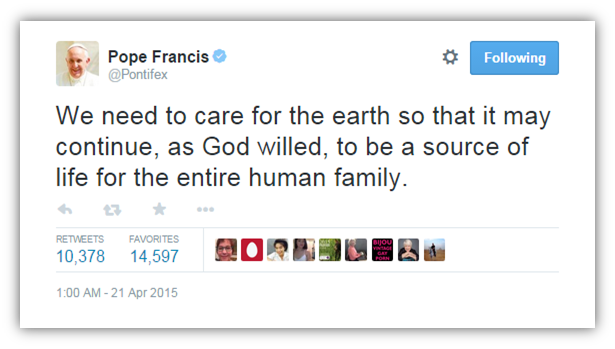
The Pope, the Poor, and the Planet
The Pope’s forthcoming encyclical on the environment will call attention to the impact of climate change on the planet and the global poor. His letter will cast a moral framework for the United Nations Climate Change Conference in Paris and the United Nations Summit in New York as they work to adopt Sustainable Development Goals (SDGs) for the next 15 years.
The Pope tweeted on April 21:
The Intergovernmental Panel on Climate Change distinguishes between climate change mitigation, which reduces impacts in future decades, and adaptation, which helps reduce risks of climate change impacts. Since the poor are most vulnerable to climate disruption, human society has a special obligation to act now to foster climate resilience, the capacity of human and social systems to withstand disruption and support dignity and the common good.
The Pope is likely to invoke a legally binding agreement among the developed nations to reduce greenhouse gas emissions and reforestation to restore natural carbon sinks. These essential climate change mitigation measures should drive a “profound transformation of energy systems by mid-century,” as articulated in the interim report of Deep Decarbonization Pathways Project.
In addition, the Pope’s encyclical will call on all people of good will to prepare the planet’s poorest three billion people for climate change impacts that are already occurring. Such preparations include access to clean energy, water for food and agriculture, economic opportunities, education, and healthcare.
the Pope’s encyclical will call on all people of good will to prepare the planet’s poorest three billion people for climate change impacts that are already occurring
Silicon Valley, the world’s richest entrepreneurial ecosystem, has a shared moral imperative to respond to the Pope’s call for action. We must take practical actions that foster climate protection and promote climate resilience for the planet’s poorest people. One avenue is through supporting social entrepreneurs, who are working to create off-grid clean energy, safe drinking water, food security, and dignified livelihoods for the poor.
At Santa Clara University’s Miller Center for Social Entrepreneurship, we combine the Jesuit tradition of serving the poor with Silicon Valley start-up DNA through our GSBI® programs. We’ve already worked with more than 365 social enterprises at the intersection of poverty eradication and climate change resilience in 61 countries. These enterprises deploy technologies that help poor communities escape energy poverty; adapt to the harmful effects of climate change on food, water, energy, and health systems; and reduce greenhouse gas emissions.
This summer, Santa Clara students from a broad range of majors – public health, economics, environmental sciences, computer engineering, communication, political science – will be in the field working with these social enterprises to help scale their impact. The convergence of disciplines is a testament to our University’s vision for sciences, technology, engineering, and mathematics (STEM): a way to engage everyone in entrepreneurship and innovation that serves humanity. The disruption of our planet’s life support system challenges business as usual in science, engineering, and entrepreneurship. Santa Clara can demonstrate how these dynamic forces can tackle climate change, and respond to the Pope’s encyclical.
Jun 16, 2015


